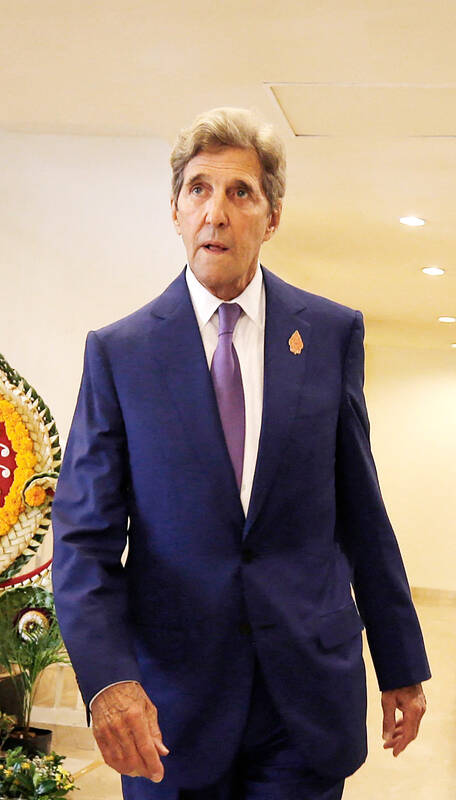A condition for the resumption of bilateral climate talks between China and the US is Washington dispelling the “negative influence” left by US House of Representatives Speaker Nancy Pelosi’s visit to Taiwan last month, Beijing said yesterday.
In response to the visit on Aug. 2 and 3, China on Aug. 5 suspended bilateral cooperation with the US in a number of areas, including climate talks and dialogue between senior-level military commanders.
In an interview with the Financial Times on Tuesday, US Special Envoy on Climate Change John Kerry — who earlier this month said the suspension of bilateral climate talks punished the entire world — urged Chinese President Xi Jinping (習近平) to resume the discussions.

Photo: AFP
Kerry told the newspaper that he was hopeful the countries could “get back together” ahead of the UN’s COP27 climate summit in November in the Egyptian resort of Sharm el-Sheikh.
China yesterday responded to Kerry’s remarks by stating that the resumption of climate talks with the US was dependent on actions taken by Washington to address the “negative influence” of Pelosi’s Taiwan visit.
“The US side should dispel the negative influence of Pelosi scuttling to Taiwan, this is an indispensable condition of China-US climate change cooperation,” the Chinese Ministry of Foreign Affairs said in a statement.
The statement also said that China would continue to participate in international forums on climate change.
Beijing’s response highlights the divergent approaches to global climate change cooperation between the world’s two largest powers.
While officials in the administration of US President Joe Biden, including Kerry, have repeatedly expressed hope that US-China cooperation on climate change would not be affected by tensions on other fronts, Beijing has rejected any separating of issues in US-China relations.

Intelligence agents have recorded 510,000 instances of “controversial information” being spread online by the Chinese Communist Party (CCP) so far this year, the National Security Bureau (NSB) said in a report yesterday, as it warned of artificial intelligence (AI) being employed to generate destabilizing misinformation. The bureau submitted a written report to the Legislative Yuan in preparation for National Security Bureau Director-General Tsai Ming-yen’s (蔡明彥) appearance before the Foreign Affairs and National Defense Committee today. The CCP has been using cognitive warfare to divide Taiwanese society by commenting on controversial issues such as Taiwan Semiconductor Manufacturing Co’s (TSMC, 台積電) investments in the

INVESTIGATION: The case is the latest instance of a DPP figure being implicated in an espionage network accused of allegedly leaking information to Chinese intelligence Democratic Progressive Party (DPP) member Ho Jen-chieh (何仁傑) was detained and held incommunicado yesterday on suspicion of spying for China during his tenure as assistant to then-minister of foreign affairs Joseph Wu (吳釗燮). The Taipei District Prosecutors’ Office said Ho was implicated during its investigation into alleged spying activities by former Presidential Office consultant Wu Shang-yu (吳尚雨). Prosecutors said there is reason to believe Ho breached the National Security Act (國家安全法) by leaking classified Ministry of Foreign Affairs information to Chinese intelligence. Following interrogation, prosecutors petitioned the Taipei District Court to detain Ho, citing concerns over potential collusion or tampering of evidence. The

‘COMPREHENSIVE PLAN’: Lin Chia-lung said that the government was ready to talk about a variety of issues, including investment in and purchases from the US The National Stabilization Fund (NSF) yesterday announced that it would step in to staunch stock market losses for the ninth time in the nation’s history. An NSF board meeting, originally scheduled for Monday next week, was moved to yesterday after stocks plummeted in the wake of US President Donald Trump’s announcement of 32 percent tariffs on Taiwan on Wednesday last week. Board members voted to support the stock market with the NT$500 billion (US$15.15 billion) fund, with injections of funds to begin as soon as today. The NSF in 2000 injected NT$120 billion to stabilize stocks, the most ever. The lowest amount it

NEGOTIATIONS: Taiwan has good relations with Washington and the outlook for the negotiations looks promising, Minister of Economic Affairs J.W. Kuo said Taiwan’s GDP growth this year is expected to decrease by 0.43 to 1.61 percentage points due to the effects of US tariffs, National Development Council (NDC) Minister Paul Liu (劉鏡清) said at a meeting of the legislature’s Economics Committee in Taipei yesterday, citing a preliminary estimate by a private research institution. Taiwan’s economy would be significantly affected by the 32 percent “reciprocal” tariffs slapped by the US, which took effect yesterday, Liu said, adding that GDP growth could fall below 3 percent and potentially even dip below 2 percent to 1.53 percent this year. The council has commissioned another institution